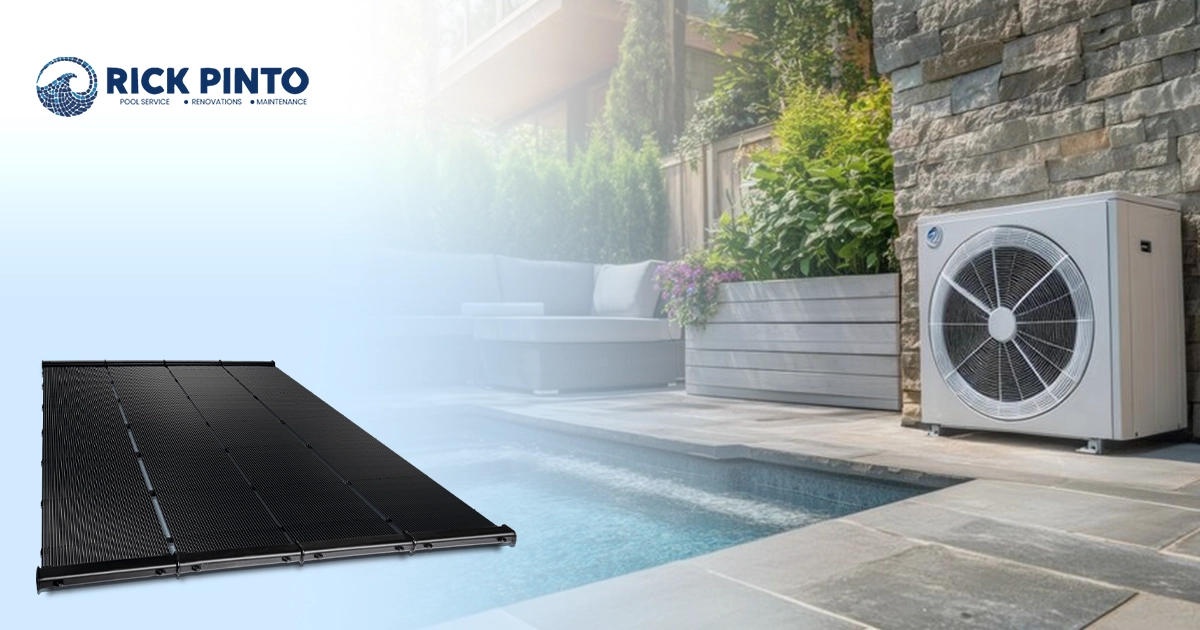
Ultimate Guide to Pool Heating Systems
Think about stepping into your pool on a cool morning. The water feels perfect, not too cold, not too warm. Just right that kind of comfort isn’t just for summer anymore.
With the right pool heating system, you can enjoy your pool for more months of the year without wasting energy or money. But here’s the thing: not all systems are made the same. Some cost too much to run. Some break down too soon. And others just aren’t installed the right way from the start
Smart pool heating is about more than just warm water. It’s about choosing equipment that saves energy, setting it up the right way and keeping it running smoothly over time. When done right it makes your pool more comfortable more reliable and more enjoyable
If you’re planning a new pool or upgrading your current system, this guide will help you make the smart choice for your pool repair. Let’s get into it.
What Is the Most Effective Pool Heating System?
When it comes to heating your pool, choosing the right system makes a big difference. The most effective option combines energy savings, reliability, and long-lasting performance. Heat pumps are often the best choice for these reasons.
- Heat pumps do not create heat but pull warmth from the air to heat your pool water, using much less energy than gas or electric heaters.
- They work best in mild to warm climates where the air temperature helps the system run efficiently.
- Heat pumps provide steady, consistent heating that keeps your pool comfortable over time.
- These systems require very little maintenance, making them easy to care for.
- Heat pumps tend to last longer than other pool heaters, offering better value in the long run.
What Is the Most Efficient Way to Heat a Pool?
Heating a pool efficiently means more than just choosing the right heater. It’s about how well the entire system is set up and cared for. The most efficient way combines a good heat pump with professional installation and ongoing maintenance to keep everything running smoothly.
- Professional installation makes sure the heater is placed in the best spot, with good airflow and proper electrical connections for safety and efficiency.
- Proper integration with your pool’s plumbing and control systems helps prevent energy loss and keeps the heater working smoothly.
- Regular maintenance like cleaning air filters and coils, checking refrigerant levels, and inspecting electrical parts keeps the heater performing at its best.
- Using a pool cover and following winterizing steps protects the heater from weather damage and reduces heat loss.
- Together, these steps help you save energy and costs while enjoying a warm pool all season long.
- They have a lower environmental impact because they use less electricity and do not burn fossil fuels.
- For homeowners who want a reliable, cost-effective, and eco-friendly pool heating solution, heat pumps offer the best balance of performance and efficiency.

Key Factors for Long-Term Performance
To get the most from your pool heating system over time, it’s important to focus on a few essential elements. These key factors not only improve efficiency but also help avoid costly repairs and extend the life of your equipment. Whether you choose a heat pump, gas heater, or another system, the following components are critical for lasting success.
Certified, Strategic Installation
Having a professional install your pool heater makes all the difference. Professionals position the heater near the pool plumbing to minimize heat loss during circulation.
In addition to that, they install the unit on a stable, well-ventilated, and level surface to help the equipment run efficiently and last longer. Using dedicated electrical circuits is another vital step to enhance safety and prevent energy waste.
Quality Equipment Selection
Not all heaters are created equal. Selecting high-quality models built to perform well in your local climate is crucial.
Look for units with strong efficiency ratings and reliable warranties to protect your investment. Well-made equipment often means fewer breakdowns and better energy savings.
Proper Integration
Your pool heater should work seamlessly with your existing plumbing and pool controls. Clean plumbing connections and leak-free fittings prevent unnecessary strain on the system.
Optimizing water flow also helps the heater operate smoothly and efficiently so your pool warms up quickly without added stress on the equipment.
Maintenance and Support
Routine pool maintenance keeps your pool heater in peak condition. This includes regular cleaning of air filters and coils to maintain airflow, inspecting refrigerant levels, and checking electrical components.
Scheduling professional checkups annually helps catch any small issues before they become expensive problems.
Environmental Protection
Protecting your pool heater from the elements is just as important as proper installation and maintenance. Using weatherproof covers shields the unit from rain, debris, and harsh sun.
Proper drainage around the heater prevents water damage, while off-season preparations like winterizing keep your system safe and ready to perform when you need it most.
Conclusion: Invest Once, Benefit for Decades
The best pool heating system is more than just the equipment you pick. It’s about how you install it, how well it fits your pool, and how you maintain it. Heat pumps, combined with professional installation and ongoing support, stand out as the smartest choice for homeowners who want lasting comfort, lower energy bills, and peace of mind for years to come.
Ready to upgrade your pool heating and enjoy a warmer, longer swimming season? Contact us today to schedule your consultation and take the first step toward efficient, reliable pool comfort.




Leave a Reply